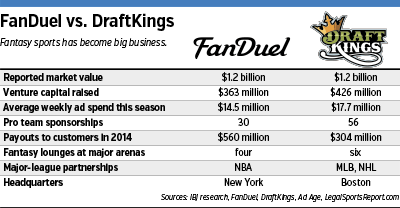Anyone else feel a class action lawsuit coming up?
and we're off ....
http://m.huffpost.com/us/entry/5616da63e4b0e66ad4c71e4e?yrvpwrk9
The scandal that has engulfed the daily fantasy sites DraftKings and FanDuel could now head to federal court.
A Kentucky man on Thursday filed a class-action lawsuit against the companies, which run the two biggest websites in the growing daily fantasy industry. First reported by the New York Daily News, the suit alleges that DraftKings and FanDuel violated fraud, negligence and consumer protection laws by allowing employees to access certain information while also participating in daily fantasy contests.
The suit, filed in the U.S. District Court for the Southern District of New York, seeks damages determined in a jury trial. In addition to alleging fraud and negligence, it claims DraftKings, which operates out of New York City, and FanDuel violated New York false advertising and deceptive practices laws and Kentucky consumer protection laws.
The plaintiff, Adam Johnson of Louisville, Kentucky, deposited "at least $100" into a DraftKings account, according to the suit. The complaint asserts that Johnson would not have participated in the contests had he known that each of the companies was allowing its employees to participate in daily fantasy games on the other's website.
 Marc Edelman
Marc Edelman 





